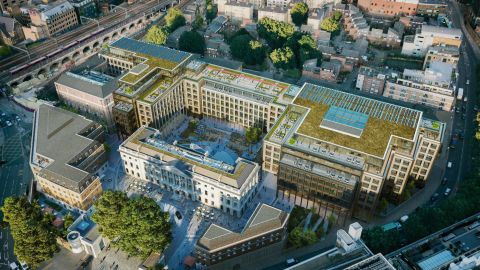
Residents of an apartment complex that sits on a historic parcel of land opposite the Tower of London want Britain’s King Charles to buy it back, claiming that its current owner, China, will turn it into a hub for shadowy diplomatic activity.
The British monarchy sold Royal Mint Court, a 5.4-acre plot that was once home to the facility that manufactured Britain’s coinage, to a property company in 2010. Beijing bought the site in 2018, and now plans to invest several hundreds of millions of dollars transforming it into its new embassy in the United Kingdom.
The local council, Tower Hamlets, is due on Thursday to decide on proposals for the site, which consists largely of decommissioned offices and a grand, 19th century building constructed for the Royal Mint. If the plans – drawn up by architect David Chipperfield – are approved, the site will become one of China’s largest diplomatic missions in the world, equipped with lodgings for hundreds of staff, a cultural exchange and a business center.
But Royal Mint Court contains something of a historical anomaly. When it still owned the land about 30 years ago, the Crown Estate, which manages the British monarchy’s non-private property interests, built a set of low-rise apartments on part of the site as part of a government scheme to provide homes for “key workers” such as police officers and nurses. Queen Elizabeth II was pictured opening the estate in 1989.
Owners of the new apartments were granted a 126-year lease over the land – a common practice in British property law where residents own the bricks and mortar of their property but another entity, a freeholder, owns the ground on which it is built.
Such leases often contain clauses that restrict certain activity in the buildings. A lease for one apartment at the Royal Mint Court development, seen by CNN, includes clauses giving the freeholder, or landlord, the right to enter the leaseholder’s property in certain circumstances. It also gives them powers to ban residents from hanging items, such as flags or signs, from the outside of their homes.
Leaseholders are also told they cannot behave in a manner deemed to cause a “nuisance” to the landlord or do anything that the landlord perceives might incite racial hatred.
The Royal Mint Court Residents’ Association, which represents around 300 people living in the buildings, say they are fearful of how China would interpret and implement such rules once its embassy is built next door. China has been accused of using its diplomatic outposts, loosely affiliated community associations, in effect, as overseas police stations to monitor Chinese citizens abroad and coerce them to return home. British lawmakers have expressed concerns over reports of three such premises in the UK.
“I fear a diplomatic incident will occur because the powers available to the Chinese government are far reaching and excessive,” wrote David Lake, chairman of the residents’ group, in a letter to King Charles, seen by CNN.




